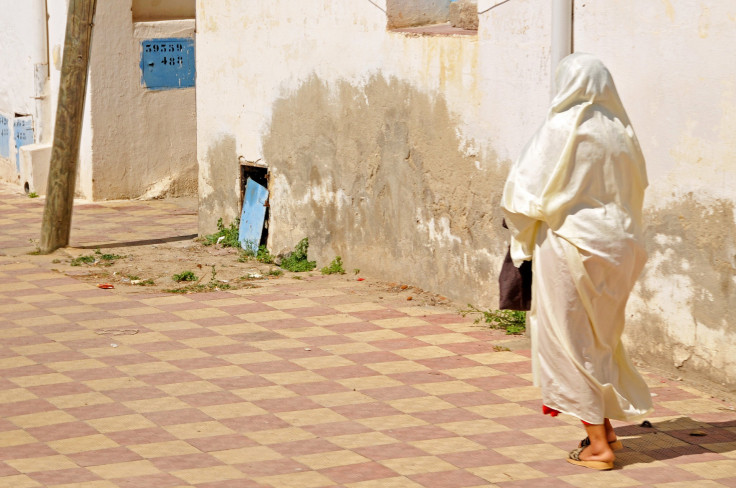Tunisian Protesters Defend Women, Not Islam

Amid a wave of protests in the Arab world this fall, one demonstration in Tunisia proves that outrage can go both ways.
Over the past month, Muslims in various Middle Eastern, North African and Asian countries have reacted strongly -- and sometimes violently -- against an offensive YouTube video that was produced in America and ridicules Islam. More than 50 people have died as a result of the ensuing clashes.
The protests evoke questions of whether free speech should take a back seat to religious values, setting the stage for some serious debates about the role of Islam in post-Arab Spring societies.
But in Tunis on Tuesday, hundreds of people gathered outside a courthouse to protest what they see as another dangerous affront -- not to Islam, but to gender equality.
At the center of this firestorm was a 27-year-old woman who kept her face covered as she exited the court and walked through the throng of protesters. She had just been questioned by a judge in order to determine whether she will be charged with indecency. If sentenced, she could face up to six months behind bars.
But the woman says she was raped by the very police officers who arrested her, and that she is innocent of any wrongdoing.
The story began on Sept. 3, when policemen came upon the woman and her fiancé in a parked car in Tunis. The officers said they found the couple in an “immoral position” and arrested them. But the woman asserts that one of the officers took her fiancé to an ATM to extort money, while the remaining two raped her in the car.
The policemen have since been arrested and are awaiting trial.
Tuesday’s demonstrators aren’t the only ones crying foul over this apparent miscarriage of justice -- even Prime Minister Hamadi Jebali has taken up the cause.
“According to the judicial authorities, there may be a case of indecency to answer, but the main thing in this affair is the unacceptable attack on the dignity of a woman... [for which] these policemen will be severely judged," he said on Tuesday, according to Agence France-Presse.
This effort to get ahead of the criticism shows that Tunisia’s new post-revolutionary government is keen to avoid a reputation for injustice. The Ennahda party that won a plurality of National Assembly seats last year is leading efforts to establish a permanent government, but its moderate Islamist bent has secular Tunisians worried about the future of their justice system.
In this small North African country, secular governance has been the norm for decades. Abortion was legalized as early as 1973. Divorce was acceptable, polygamy was outlawed and women were equal to men according to the constitution.
But the old way of doing things was discarded last year.
Tunisia was the country that kicked off the Arab Spring in early 2011, after a produce vendor named Mohamed Bouazizi protested against the government by setting himself aflame. His fatal act sparked a movement against the oppressive rule of then-President Zine el-Abidine Ben Ali. The so-called Jasmine Revolution was a success, and the secular administration was overthrown after 28 days of demonstrations.
Ennahda took control upon the inauguration of the new national assembly in November of 2011. One of its responsibilities is to oversee the drafting of a brand new constitution for this majority-Muslim state.
Though some Ennahda officials had promised that the new constitution would not be based on shariah Islamic law, an August draft of the document raised alarm bells when it referred to women as “partners” to men, adding that they should perform a complementary role in the household. The wording was subject to interpretation, but many women complained that it marked a definite downgrade from the previous constitution.
Following protests, the offensive wording was eventually dropped. The new constitution is still under construction, but could be completed by early next year.
In this environment, many Tunisians see the 27-year-old woman’s rape case as a dire warning. If an Ennahda-led government can turn a rape victim into a criminal, argue activists, the revolution would be an abject failure.
But early reports from the woman’s lawyers are positive. Following the Tuesday interview with the judge, two of them told Agence France-Presse that they were optimistic.
“It would be unreasonable to maintain such accusations,” said Emna Zahrouni. “I am confident about the fairness of the law."
“I told the judge he had a historic responsibility,” said Monia Bousselmi, another lawyer. “The whole world, the media, Tunisia's youth are awaiting his decision, which will be decisive in establishing the rule of law.”
That’s especially important to Tunisia, which bears a unique burden of precedence. As the leader of the Arab Spring, this small nation of 11 million people could set the tone for all of the Islamic countries that have followed in its revolutionary footsteps.
© Copyright IBTimes 2024. All rights reserved.






















